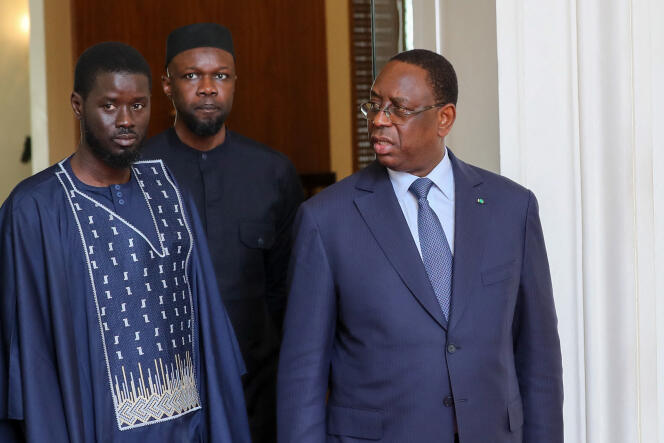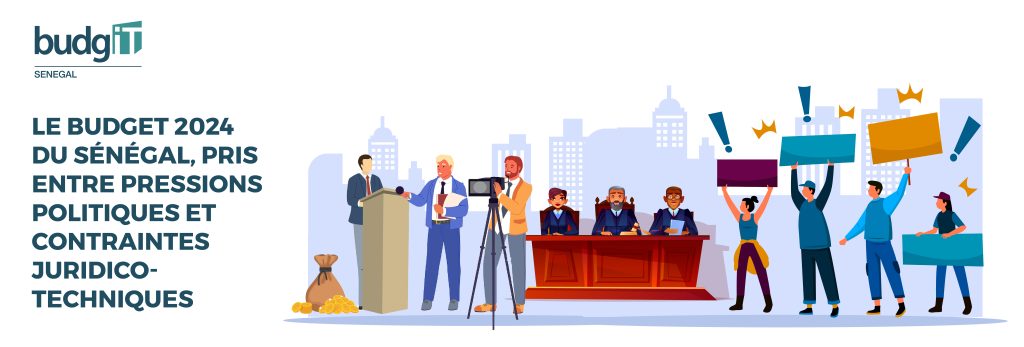The Senegal budget has experienced considerable strain in recent months. In fact The 2024 budget is particularly noteworthy for several reasons, including the dual management by two different governments, the controversy surrounding the accuracy of the figures or the accounting system in place, and the compromised nature of the national assembly that approved the budget. These concerns have been raised by the media and Civil Society Organizations (CSOs) working on budget transparency.
The new administration’s inability to continue the “Senegal emergent” plan which depends on depts to foster economic transformation, put a significant strain on the 2024 budget. The proposed budget relies primarily on resources provided by the previous administration’s “Senegal Emergent” plan, which clashes with the current president’s ideals, Diomaye Faye, who believes in establishing an endogenous economy. This power shift has made it extremely difficult for the government to implement the 2024 budget successfully.
Controversy around the budget: Expectations for an updated finance act and unclear vision for Budget 2024

The budget is a financial act that embodies a legal aspect. In Senegal, it is composed according to the economic context of the Initial Finance Act (LFI), the Rectifying Finance Act (in case of budget update), and the Regulations Act, which assesses management during a specific fiscal year. Therefore, we are confronted with two challenges: the absence of a critical debate called “Budget Orientation Debate” and the uncertainty of this current national assembly voting on the budget, which is closer to dissolution than anything else. The first challenge is mainly technical, while the second one is political. The Senegalese representatives (MPs) missed a significant opportunity to listen to the Ministry of Finance and Budget, which prevented them from presenting the current state and perspectives of budget management. Therefore, people are wondering if the budget will be updated or if it will be executed until December.
Upon analysis of the latest unplanned revenue and expenditure, the second option seems more viable. Factors such as the decrease in prices of basic needs, the integration of digital taxes, the rise in subsidies for underserved farmers, and the new taxation system by the government of Diomaye indicate the need for the government to call the parliament to rectify the budget. However, it raises the question of which parliament should be involved – the one set to be canceled on September 31st or the one to be installed after a minimum of 3 months.
If the government dissolves the current parliament, it will necessitate changes to all options and impact the budget cycle, which is due to start in October with the 2025 budget project. This will also affect the budget agenda, as indicated by the latest results of the Open Budget Survey. Moreover, it will hinder the new government from presenting its genuine budget orientation for the 2025 fiscal year.
The budget spending skyrocketed at an unprecedented rate!
In the second half of July, the Ministry of Finance and Budget has still not published the budget execution report for the second quarter. Despite the rise in revenue mobilization, there has been a significant increase in public spending. According to the Direction de la prévision et des études économiques (DPEE), overall resources (excluding capital grants) at the end of June 2024 are provisionally estimated at 1,855.6 billion CFA francs, an increase of 4.5% compared with the same period in 2023. However, this increase in revenue is accompanied by a parallel growth in public expenditure, estimated at 2,232.5 billion CFA francs, an increase of 3.1%.
Tax revenue, which constitutes the bulk of overall resources, amounted to 1,775.7 billion CFA francs, representing an increase of 7.2%. The department attributes this performance to increased collections of corporate income tax (+54.2 billion), income tax (+9.7 billion), domestic VAT excluding oil (+19.8 billion), taxes on income from securities and movable capital, which rose by 14.6 billion, and gate duties and import VAT, which increased by 7.7 billion and 16.7 billion respectively. However, some sectors showed signs of weakness, with a notable fall in domestic VAT on oil (-52.9%), tax on financial activities (-12.1%), and the levy on the energy sector (-35.6%). Public expenditure rose by 3.1% to CFAF 2,232.5 billion. This increase was mainly due to the rise in the wage bill (+12.6%) and interest on the public debt (+40.9%), which amounted to CFA 709.9 billion and CFA 395.6 billion, respectively.
Hopefully, the second quarter budget performance report will be published soon, and we will have more clarification about this.
Senegal’s 2024 Budget in Limbo Amidst Political Turmoil and Technical Hurdles
Senegal’s 2024 budget has been under considerable strain in recent months. Several controversies surround the accuracy of the figures, the accounting system in place, and the compromised nature of the national assembly that approved the budget. The budget, heavily reliant on the resources outlined in the previous administration’s Plan Sénégal Émergent, has been thrown into disarray by the new government’s divergent economic philosophy. President Diomaye Faye’s emphasis on an endogenous economy clashes sharply with the outward-looking strategies of his predecessor. This ideological rift has made it increasingly difficult to execute the 2024 budget as initially conceived.
Compounding the issue is a growing criticism from media and civil society groups over budget accuracy, the underlying accounting system, and the legitimacy of its approval by a compromised national assembly. The absence of a crucial “Budget Orientation Debate” has deprived lawmakers of critical information about the nation’s fiscal health and future trajectory, limiting their oversight function.
The government is grappling with the need to rectify the budget in light of unforeseen economic shifts – including declining prices, new tax regimes, and increased subsidies. However, the looming dissolution of parliament raises concerns about the appropriate legislative body to approve any necessary amendments. This political deadlock threatens to derail the entire budget cycle, with potential repercussions for the upcoming 2025 fiscal plan.
The situation is further complicated by the government’s inability to articulate a clear financial strategy for the country. Without a robust budget orientation, Senegal risks entering a period of fiscal uncertainty, hindering economic growth and development.
According to the Direction de la Prévision et des études économiques (DPEE), overall resources (excluding capital grants) at the end of June 2024 are provisionally estimated at 1,855.6 billion CFA francs, an increase of 4.5% compared with the same period in 2023. Despite a modest revenue increase of 4.5%, public spending has surged by a concerning 3.1% in the first half of 2024, estimated at 2,232.5 billion CFA francs, raising alarms about the country’s fiscal health. This alarming expenditure growth is due to wage bills and interest payments on public debt.
Tax revenue, which constitutes the bulk of overall resources, amounted to 1,775.7 billion CFA francs, representing an increase of 7.2%. The department attributes this performance to increased collections of corporate income tax (+54.2 billion), income tax (+9.7 billion), domestic VAT excluding oil (+19.8 billion), taxes on income from securities and movable capital, which rose by 14.6 billion, and gate duties and import VAT, which increased by 7.7 billion and 16.7 billion, respectively. However, some sectors showed signs of weakness, with a notable fall in domestic VAT on oil (-52.9%), tax on financial activities (-12.1%), and the levy on the energy sector (-35.6%). Public expenditure rose by 3.1% to CFAF 2,232.5 billion. This increase was mainly due to the rise in the wage bill (+12.6%) and interest on the public debt (+40.9%), which amounted to CFA 709.9 billion and CFA 395.6 billion, respectively. The absence of the second-quarter budget execution report from the Ministry of Finance and Budget only deepens the uncertainty surrounding the government’s financial management.
